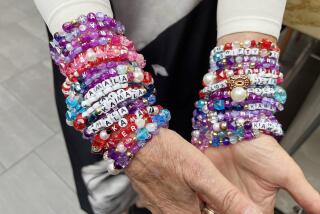POLITICS 88 : To Them, He’s the Candidate of Big Business : Memento Vendors Find Prosperity With Jackson
- Share via
COLUMBUS — When Jesse Jackson raised his fist for his trademark thumbs-up salute at New Salem Baptist Church here, the crowd squealed at his cleverly designed rainbow-patterned glove.
Dozens lifted their identical left gloves in reply, each set of five fingers imprinted with letters that proclaimed “Jesse.”
It was a promising sight to 27-year-old law student Adam Troy, who was selling the gloves for $10 apiece outside.
Troy says he and his partners will turn over 20% of the proceeds to the campaign. The remainder, he said, “will help a struggling law student pay for a few law books.”
Indeed. Troy and his partners, venturing an initial $2,000 investment, are asking more than double the $4 they estimate each glove costs.
For hundreds of entrepreneurs around the country, Jesse Jackson’s name and face are big business.
Tribe of Vendors
Other candidates must print and give away their own placards, buttons and bumper stickers. But Jackson’s rallies are besieged by a growing tribe of vendors.
Their memorabilia ranges from saucer-sized buttons to umbrellas, to running suits, to personalized $100 satin baseball jackets. One church forbade its members to take pictures of a Jackson speech, and then offered videotapes of the event for $35 each.
Jackson followers buy up these items as fast as they can. Like fans at rock concerts, they clamor for something tangible--a way of preserving the feeling they got when they saw their candidate in person.
“Anything that has Jackson’s name, anything that has a Jackson connection, people will go for without question,” says Paul Cloutier, who directs the campaign’s booming paraphernalia business. “They mob me.
“I see it as like a Jackson mania,” he added, “people wanting a piece of Jackson that makes them a part of not only what Jackson is doing, but part of history.”
Cloutier guesses that the Jackson campaign pulls in $20,000 a month from its own paraphernalia. And untold amounts are reaped by the independent vendors who set up displays everywhere Jackson goes, often without the campaign’s permission.
Campaign Veterans
Some are campaign veterans, logging almost as many miles as the candidate himself. In her gold lame knee-length veil, a woman calling herself Empress Ima stood out among the sellers of key chains and buttons in Cleveland.
Empress Ima first began trailing Jackson in 1984, she said, and this year has already been through New York, Ohio, Pennsylvania and Washington, D.C. A seasoned political strategist of sorts, she grumbled that the crowds would be bigger if the campaign were better organized.
Asked whether she gets the campaign’s permission to set up her board of buttons, Empress Ima said: “Sometimes we can; sometimes not.” She claimed to give 25% of her profits to the campaign.
Cloutier said there is “a low percentage of people trying to leech off the campaign, but there’s no way the campaign can do anything about it.”
Federal election laws prevent the campaign from directly selling its items, but the ban is only one of semantics. Cloutier said it can require a “minimum donation.”
Some Authorized
The Jackson campaign also authorizes certain vendors to set up their stands inside campaign events, he added, but does not demand a fee or a share of their profits.
In poorer neighborhoods, Cloutier said, he often gives buttons and photographs of Jackson away. “I always think it’s more important that they get something that’s Jackson, than the money that comes in.”
Jackson seemed particularly impressed with the glove he received here, and summoned its designer, Kym Allen, on stage for a hug.
“We’re going after the California market,” she said happily. “This was the kickoff here.”
But in the serious business of serious business, not everyone is so cheery.
“I’m not interviewing, sweetheart, I’m trying to make some money,” one vendor told a reporter who asked about the array of merchandise he had spread across a Cleveland sidewalk. “You’re not even buying a button.”
More to Read
Sign up for Essential California
The most important California stories and recommendations in your inbox every morning.
You may occasionally receive promotional content from the Los Angeles Times.













